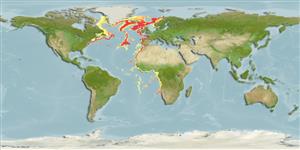Preferred temperature (Ref.
115969): 1.1 - 12.6, mean 7.1 (based on 244 cells).
Phylogenetic diversity index (Ref.
82804): PD
50 = 0.5078 [Uniqueness, from 0.5 = low to 2.0 = high].
Bayesian length-weight: a=0.00046 (0.00033 - 0.00063), b=3.15 (3.06 - 3.24), in cm Total Length, based on LWR estimates for this species (Ref.
93245).
Τροφικό Επίπεδο (Ref.
69278): 4.5 ±0.77 se; based on food items.
Ελαστικότητα (Ref.
120179): Χαμηλό, ελάχιστος χρόνος για διπλασιασμό πληθυσμού 4,5 - 14 έτη (K=0.11-0.25, tmax=14).
Prior r = 0.20, 95% CL = 0.13 - 0.30, Based on 3 full stock assessments.
Fishing Vulnerability (Ref.
59153): High vulnerability (64 of 100).
Climate Vulnerability (Ref.
125649): Moderate vulnerability (44 of 100).
